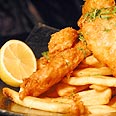
Fish 'n chips: Jewish cuisine?
Conference examines culinary aspects of Middle East, mixed cultural influences that have come to define Jewish food
The conference will discuss the relationships between food and power, and food and cultural identity, and will include a panel of various food writers and chefs.
A subject of great contention: the origin of fish and chips. According to British expats, the dish is of English origin, though the region is not specifically known for its culinary prowess.
In fact, much of the United Kingdom’s tasty fare comes from different incoming immigrant populations, and it has been argued that fish and chips is actually a dish of Jewish origin – a cultural staple found at Saturday morning "Kiddush" in British synagogues. This apparently stems from the traditional Jewish practice of cooking and frying the fish the night before, so as not to have to cook on the Sabbath.
Apparently, fish and chips had been brought over to the UK by Jewish European immigrants in the mid 19th century, and chips, as they are known today (thick chunks of deep fried potatoes), were first popularized in Scotland.
As the story goes, deep fried fish then made its way north from London, while the fried potatoes made their way south, happily meeting in Manchester (home of the second largest concentration of Jews in the UK) where the fish and chip combination was solidified.
'Fried in the Jewish fashion'
According to a 2003 article from The Observer, the first fish and chip shop was opened in London in 1860 by a Jewish proprietor named Joseph Malin, who combined chips with fish “fried in the Jewish fashion.”
Interestingly, the first literary mention of chips in this sense came just a year earlier, in Charles Dickens’ A Tale of Two Cities: “Husky chips of potatoes, fried with some reluctant drops of oil.” Regardless, by the early 1900s, there existed more than 30,000 “chippies,” or traditional fish and chip shops, in Britain alone.
Currently in Ireland and the UK, fish and chips must adhere to an act passed in 2003, called Fish Labeling Regulations, whereby fish must be sold with its specific species name. This sort of transparency regarding food just seems to makes sense.
According to Margie Arosh, Shalom Toronto’s food columnist, “My favorite food of all time is fish and chips.” As such, she was delighted to recall for us a trip to London in 1995, where “the first thing my friend and I did was go to a little shop to eat fish and chips. Then we went out for dinner and on the way back home, we could not resist stopping again for fish and chips again.”
Arosh told Shalom Life that while she has never read anything on the origins of fish and chips, she is not surprised at the prospect that it might be Jewish.
Arosh also offered a few tips regarding making a tasty fish and chip dinner (or lunch, or snack): first, always make the dish with fresh fish – the best variety is a halibut or a cod, in thick filets. She also suggests deep frying in hot oil, but not before coating the fish in a beer batter.
Reprinted with permission from Shalom Life










